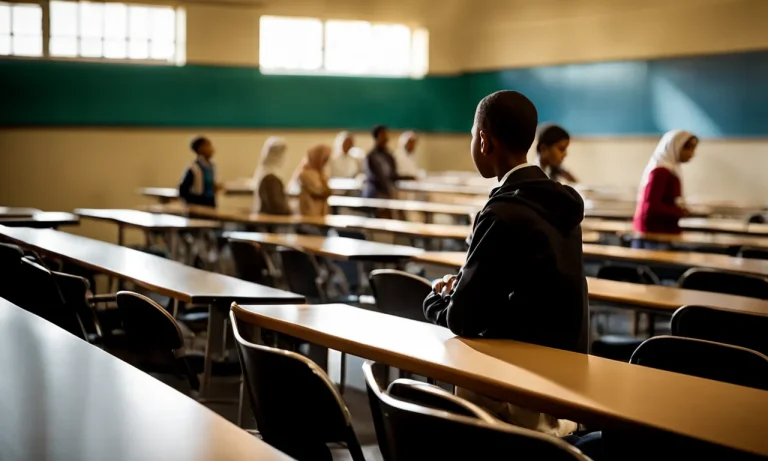Failing a class in high school can be stressful and concerning. As a student, you may be worried about how failing one or more classes will impact your ability to graduate on time. The good news is that most school districts allow students to fail some classes and still meet graduation requirements.
However, failing too many classes can put graduation in jeopardy.
If you’re short on time, here’s a quick answer to your question: Most school districts allow students to fail 1 or 2 semester-long classes and still graduate on time. However, failing more than 2 classes may require credit recovery to meet graduation requirements.
Typical High School Graduation Requirements
Number of Credits Needed
High school graduation requirements vary from state to state and even from school to school. However, most high schools in the United States typically require students to earn a certain number of credits in order to graduate.
The exact number of credits needed can range anywhere from 20 to 30, with the average being around 22 credits.
Core Subject Requirements
In addition to earning a certain number of credits, high school students are usually required to complete specific courses in core subjects such as English, math, science, and social studies. These core subject requirements ensure that students have a well-rounded education and are prepared for college or the workforce.
For example, a typical high school might require students to take four years of English, three years of math, three years of science, and three years of social studies.
View this post on Instagram
Elective Requirements
Alongside the core subject requirements, high schools often have elective requirements. Electives are courses that allow students to explore their interests and passions beyond the core curriculum. These courses can include subjects like art, music, physical education, foreign languages, and more.
The number of elective credits required can vary, but it is common for high schools to require students to complete a certain number of elective credits in addition to the core subject requirements.
It’s important to note that while these are general guidelines, each high school may have its own specific graduation requirements. It’s always a good idea for students and their parents to consult with school counselors or refer to their school’s official website for the most up-to-date information on graduation requirements.
How Failing Classes Impacts Meeting Graduation Requirements
Graduating from high school is an important milestone in a student’s life. However, not everyone follows a smooth academic path. Failing classes can have serious consequences and may affect a student’s ability to meet graduation requirements.
It is essential to understand how failing classes can impact a student’s progress towards graduation.
Failing Core Classes
Core classes, such as English, math, science, and social studies, are the foundation of a high school education. Failing these core classes can have a significant impact on a student’s ability to graduate.
In most schools, students are required to pass a certain number of core classes to meet graduation requirements. If a student fails one or more of these classes, they may need to retake the course or complete credit recovery options to earn the necessary credits.
It’s important to note that failing core classes not only affects a student’s academic progress but also their overall GPA. A low GPA can limit a student’s opportunities for scholarships, college admissions, and future career prospects.
Therefore, it is crucial for students to seek support and resources to improve their performance in core classes and avoid the negative consequences of failing.
View this post on Instagram
Failing Electives
While core classes are essential, high schools also offer a variety of elective courses that allow students to explore their interests and broaden their horizons. Failing electives may not have the same direct impact on graduation requirements as failing core classes.
However, it is still important for students to take their elective courses seriously and strive for success.
Some elective courses may be required for graduation or have prerequisites for higher-level courses. Failing an elective may limit a student’s options for future course selections and prevent them from pursuing certain career paths.
Additionally, colleges and universities often consider a student’s overall academic performance, including both core and elective classes, during the admissions process. Failing multiple elective courses may raise concerns about a student’s commitment and ability to succeed academically.
Credit Recovery Options
If a student fails a class, there are typically credit recovery options available to help them get back on track. Credit recovery programs allow students to retake failed classes or earn missing credits through alternative methods.
These programs may include online courses, summer school, or additional assignments.
It’s essential for students to take advantage of credit recovery options and work closely with their school counselors to develop a plan for success. By successfully completing credit recovery programs, students can regain lost credits, meet graduation requirements, and stay on track towards their educational goals.
Remember, while it’s important to have a strong academic record, it’s equally important to seek support when facing challenges. High school is a time for growth and learning, and setbacks should be viewed as opportunities for improvement.
By taking proactive steps to address failing grades and utilizing available resources, students can overcome obstacles and achieve their goals.
Strategies to Avoid Failing Classes
Failing a class can be a stressful experience for high school students, but with some effective strategies in place, it is possible to avoid this outcome. Here are some key strategies to help you succeed in your classes:
Attend Class Regularly
Regular attendance is crucial for academic success. Attending class allows you to stay up-to-date with the course material, participate in class discussions, and ask questions when needed. It also shows your commitment to your education and helps you build a positive relationship with your teachers.
According to the National Center for Education Statistics, students who attend class regularly are more likely to earn higher grades.
View this post on Instagram
Complete All Assignments
Completing assignments on time is another important aspect of avoiding failure in high school. Evidence shows that students who consistently complete their assignments tend to perform better academically. Make sure to understand the requirements of each assignment and allocate enough time to complete them thoroughly.
If you’re struggling with a particular assignment, don’t hesitate to ask your teacher for clarification or assistance.
Ask for Help When Needed
Don’t be afraid to ask for help when you’re struggling with a particular subject or concept. Seeking assistance from your teachers, classmates, or tutors can make a significant difference in your understanding and performance.
Evidence confirms that students who ask for help are more likely to improve their grades. Remember, there’s no shame in asking for help, and it’s a sign of strength and determination.
Manage Time Effectively
Time management plays a crucial role in academic success. By effectively managing your time, you can ensure that you have enough time to study, complete assignments, and engage in extracurricular activities.
Create a schedule or use a planner to prioritize your tasks and allocate specific time slots for studying and completing assignments. This will help you stay organized and avoid last-minute cramming, reducing the risk of failure.
Stay Organized
Staying organized is essential for staying on top of your coursework and avoiding failure. Keep track of important dates, deadlines, and assignments using a planner or digital tools. Organize your study materials and notes in a way that makes them easily accessible.
A study published in the Journal of Intelligence found that students who are organized tend to have better academic performance. By staying organized, you can stay focused, reduce stress, and increase your chances of success.
By implementing these strategies, you can significantly reduce the risk of failing classes in high school. Remember, success in high school is not only about academic achievement but also about personal growth and development.
Embrace these strategies, stay motivated, and strive for excellence in all areas of your high school journey.
Conclusion
While most school districts allow some flexibility for failed classes, too many fails can jeopardize on-time graduation. The best approach is to adopt strategies to avoid failing in the first place. Attend class, complete work, ask for help when needed, manage time well, and stay organized.
With discipline and hard work, you can successfully earn the credits needed to graduate high school on schedule.






